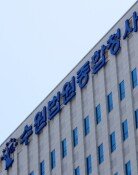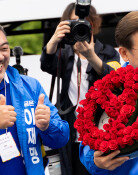[Editorial] Why Term Limit Reform?
[Editorial] Why Term Limit Reform?
Posted January. 10, 2007 07:24,
President Roh has laid open the card of a constitutional amendment, facing the end of his term. Through a sudden pan-national special address yesterday, he proposed the replacement of the single 5-year presidency term with a two 4-year term system, which shortens the length of a term by a year but allows consecutive terms. This is the so-called one point constitutional amendment that alters only the power structure.
Pointing to the fact that a constitutional amendment was part of the election pledges in the 2002 presidential election, President Roh said he will exercise the initiative for a constitutional amendment. Chief Presidential Secretary Lee Byeong-wan said, If completed before April or May, there will be no encumbrance caused (to the presidential election schedules), reflecting that it will not be long before the initiative is made. Finally, President Roh has initiated the constitutional amendment phase.
The inevitable and fundamental question is why now? In the national address, President Roh premised that regarding the constitutional amendment for two 4-year presidency by saying, There is very high consensus among the nation. But various polls reveal otherwise. The agreement rates of the constitutional amendment for consecutive presidencies including the two-term presidency turn out to be 35-40%. Even in the portion the opinion that the amendment should be promoted in the next presidential term is overwhelmingly more dominant than the opinion that it should be done during the last months of the current president. This is because while many admit the necessity to discuss amendments of the current constitutional law, which was established in 1987 to prevent long-term rule, they are also cautious about the possibilities of amendments being reckless and being utilized as strategic cards.
In the academic and political circles, voices have been raised from the beginning of last year that if discussions are to be held on constitutional amendments, it should be no later than now. Had President Roh thought the constitutional amendment as a task to be dealt with during his term, he should have hurried to organize a body promoting the amendment involving the parties of both sides and the academics. But at that time President Roh had said, Its not the system that matters. What counts more than the constitutional law is the culture of politics. Its unlikely I will conduct the amendment actively. Then he had proposed the grand coalition which shook up the political circle for the next four months.
President Roh asserted that the single presidency system impairs responsible politics but this comment can also mislead the Koreans greatly. The logic resembles the one he involved in the proposition of the grand coalition that the reason he is unable to perform national affairs appropriately is the composition of A small ruling party and a large opposing party. In the U.S., the origin of the presidency system, movements are being pressed toward an amendment into a single 6-year presidency based on the reason that the current consecutive 4-year presidency hinders coherence operation of national affairs with the need to prepare for the next election. Some research results reveal that the efficiency of governing elevates when different parties are in charge of the presidency and the national assembly. Nevertheless President Roh attributes the causes to failed national affairs to the system.
I have no strategic intentions, and the card is neither favorable nor unfavorable for any of the political streams, said the president, but there are plentiful reasons that make the assertion vulnerable to doubts regarding its candor. First of all, the explosiveness of the constitutional amendment talks can put off other policy agendas by at least 3 to 4 months. The responsibility of the president on actual politics or the inconsistency of the ruling party will be covered up and the concerns of the people turned away from the performances of strong candidates of the presidential election. This can bring about a situation absolutely favorable for the ruling party and absolutely adverse for the opposing party.
President Roh, however, is driving even the advocates of constitutional amendment in the next term as those irrational groups, by saying, It is rational that one who administers the national affairs with responsibility advocates this amendment. Even if the one point amendment is supported, it is dubious whether the amendment will be carried out on time considering the possible expansion of controversy over sensitive issues such as the article on territory once the amendment talks are given full drives. No wonder many outside the political circle interpret the proposition of the constitutional amendment as the card to shuffle up the presidential election to extend the regime by another term.
What most of the nation expects of the president at this point is to pull his legs out of the politics and focus on the welfare of the people, the recovery of the Korea-U.S. alliance, and the contraction of the Korea-U.S. FTA at least for the last 13 months of his term. Notwithstanding, the president has tossed the controversial issue of a constitutional assignment, even putting aside the beginning-of-year conference in which he should project the plans on national operation this year.







